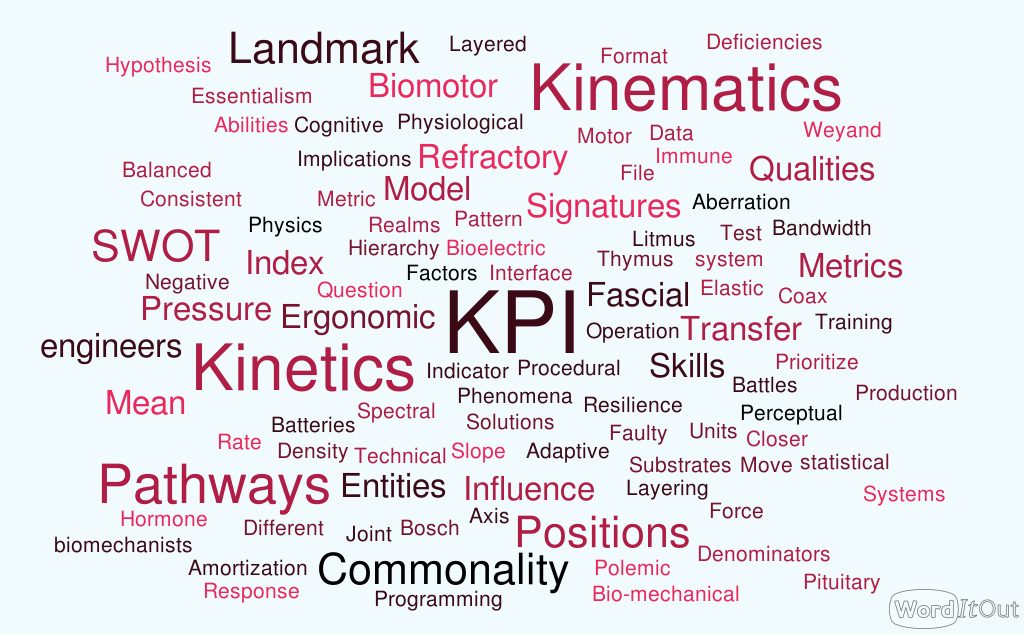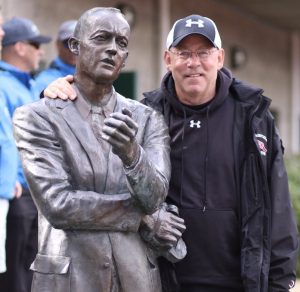The Echo Chamber of the Experts

We all envy the experts.
Hunter S. Thompson typed every page of F. Scott Fitzgerald’s “The Great Gatsby” to get the feel of writing a classic. He typed some pages more than once. Maybe someday I will do the same with my favorite classic, “War and Peace”. At 587,287 words, maybe not.
To me, the classics are hard to read. With the help of an enthusiastic English teacher and/or Cliff Notes, sometimes the classics can be translated and understood, maybe even appreciated.
Are the classics over-rated?
Are experts over-rated?
Maybe the experts are so damn smart, they no longer speak the language of the masses. Maybe they no longer connect with average man. Maybe the experts surround themselves with other experts and the echo chamber becomes the new normal.
I recently listened to a 36-minute podcast where a legendary track & field expert was interviewed. I liked a couple of his points. However, it was the terminology, vocabulary, and phraseology that blew me away.
I listened to the podcast four times. Am I missing the necessary coursework to comprehend the experts? Has a lifetime of teaching teenagers stunted my growth? Or, do experts speak with an unnecessary complexity?
I understand that experts in all fields develop vocabulary and buzzwords that separate them from “the others”. Doctors call cuts and bruises lacerations and contusions. Former teachers talk different when they become principals. Chapter tests become outcome assessments. Hard work becomes rigor. Working together becomes cooperative learning.
This article is not a hit job on a universally respected icon. Instead, this article is a discussion of the terminology, vocabulary, are phraseology of an expert. Like Hunter S. Thompson, I am transcribing the words of an expert in an attempt to gain understanding.
I had originally wrote all 66 terms and phrases, with definitions, in the body of this article. However, my article started to replicate the podcast itself. When you use complexity to do a satire on complexity, you run the risk of losing your audience due to complexity. In other words, my article was gobbledygook, just like the podcast. Gobbledygook is defined as “meaningless or made unintelligible by excessive use of abstruse technical terms; nonsense”.
So, if you want to see the 66 terms and phases from the podcast, you must go to this link, 66 Complex Terms and Phrases.
For a brief sampling, here are 10 of the 66 complexities (without my attempt at definitions):
♦ SWOT Analysis
♦ Hierarchy of KPIs
♦ Kinetics and Kinematics
♦ Landmark Pathways
♦ Amortization Factors
♦ Ergonomic Analysis
♦ Fascial Training Implications
♦ Cognitive Perceptual Skills
♦ False Movement Signatures
♦ Faulty Joint Positions
♦ Negative Transfer
And check out the paragraph that ended the discussion:
“I’m not going to look at just biomechanists. I’m going to look at economists, measurement people, management, engineers, system engineers; I’m looking at how these unique disciplines are applying statistical pressure to certain metrics and when I start to see a commonality of approach on those various entities, that’s my starting point.”
“That’s Awesome!”, said the interviewer. What else could he say? Maybe he could have said, “That’s the biggest load of bullshit I’ve ever heard in one paragraph!”
Whew! I listened to this mind-numbing word salad four times and took notes and then typed my notes. I’m speechless. I’m without words. I’ve taught science and coached for 36 years. I’ve read a thousand books. I’m ill-prepared for this level of dissertation.
Just like Hunter S. Thompson, I want to understand the best in the business. I want to speak and understand their language.
The iconic figure of this article will exist above the criticism or praise of a commoner like me. He has cemented his legacy forever. However, a friend who will remain nameless commented, “I love the guy and have listened to all of his podcasts. He’s great at saying things without really saying anything.” Brilliant!
In 1999 I attended an Advanced Placement Conference for A.P. teachers (A.P. courses are college courses taught to high school students for possible college credit). One presenter told us NOT to simplify for our students. We were encouraged to keep the bar high. The only way students will rise to the top of their field is by understanding the experts and eventually talking like experts. This was a watershed moment for me. Am I going to teach with complex sophistication or mature simplicity? I chose the latter.
In 2005, my department chair (Franklin HS, TN) gave me a glowing evaluation as a chemistry teacher. She told me that I was a connector with kids; a professional simplifier of complex material. I will never forget those kind words.
In 2009, I was coaching football with my good friend, Lawrence Wayne. We had a serious talent deficit and, in addition, several key players seemed uncoachable. Lawrence was a former high-level football player and had coached at the college level. Lawrence said, “As a coach, it’s not what you know, it’s what you can get kids to understand.”
I listened to the podcast multiple times to learn something from someone smarter than me. The expert’s intelligence was never in question. I strongly agreed with a couple of his points. The rest came from the echo chamber of sophisticated complexity.
Gobbledygook!
+++

Tony Holler has taught Chemistry and coached track for 36 years at three different high schools, Harrisburg (IL), Franklin (TN), and Plainfield North (IL). Inducted into the ITCCCA Hall of Fame in 2015, Holler’s teams have continued to feature great sprinters. Along with Chris Korfist, Holler co-directs the Track Football Consortium held twice a year (June and December). Holler has written over 100 articles promoting the sport of track and field and sharing everything he knows. His articles can be found at ITCCCA.com, FreelapUSA.com, and SimpliFaster.com. You can follow Coach Holler on Twitter @pntrack and email him at tony.holler@yahoo.com.
